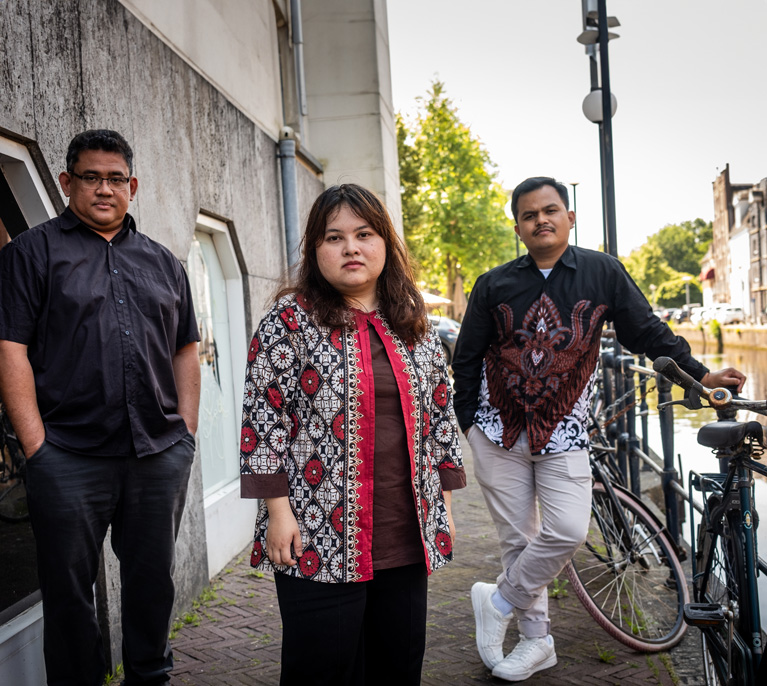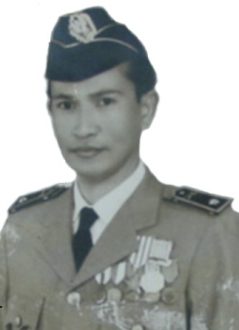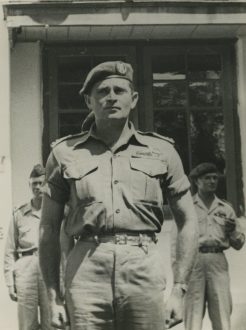
Indonesia
‘I can see the guilt in their eyes’
South Sulawesi, Indonesia, 1947. In the dead of night, gunshots ring out in a modest house sheltering two Indonesian soldiers. One soldier dies instantly, while the other one is kept alive.
‘My grandfather was spared because he spoke Dutch’, says Batari Oja, recounting the event.
‘Who are you?’ one of the Dutch soldiers who entered the house wants to know.
‘I’m Lieutenant Andi Abdul Lathief’, Oja’s grandfather says.

The two opposing soldiers then exchange some more words in Dutch, before the weapons are finally put away. As Lathief holds his breath, the soldier gives instruction to his men, saying: ‘Don’t hurt this one. He is to become my personal prisoner.’
Westerling Method
The Dutch soldier in question was none other than Raymond Westerling, the commanding officer of Dutch troops, sent to South Sulawesi to reclaim colonial rule over Indonesia. The same man who was responsible for mass killings of locals he labelled as ‘rebels’ against Dutch colonial rule.
Employing what became known as the ‘Westerling Method’, suspected rebels were rounded up and publicly executed to instil fear. Some accounts also suggest that suspects were forced to fight each other, with the ‘loser’ executed on the spot. Ultimately, Indonesia estimates around 40,000 lives were lost during this brutal period.

‘Westerling was known as this monster, so I often wonder, why didn’t he kill my grandfather? Why did he keep him alive?’ says Oja, a PhD candidate from Makassar, the capital of South Sulawesi.
Political frame
For her, the colonial past of Indonesia is very much still alive. She gathers accounts of her grandfather’s experience through biographies of fighters from the War of Independence and newspaper clippings that featured her grandfather. ‘I think it’s important for young generations to explore history through references beyond official sources, because history is often controlled by politics.’
Chris Wibisana feels the same way. The student from Tangerang, near Jakarta, has a Chinese-Indonesian background. His grandfather’s family home was burned to the ground during severe, racially motivated anti-Chinese riots that broke out after a Dutch military officer of Chinese descent raised a Dutch flag, seemingly showing his loyalty to the coloniser. The riots left over a thousand Chinese-Indonesian men, women and children in the region dead.
We need to remember that we were once abused and trampled over
The violence was partly fueled by the colonial hierarchy that economically benefited the Chinese above ‘native Indonesians’, casting doubt on Chinese-Indonesians’ loyalty to the Indonesian revolution.
‘My grandpa was only a year old when he was taken away by his parents on a boat to Jakarta’, Chris says.
For him too, the historical struggle of colonial times is still relevant. ‘Stories like my family’s reject official historical framing from governments that are filled with censorship and memory politics. We need to remember that we were once abused and trampled over; we need to remember, not to play victim, but to learn how to treat ourselves better than the colonisers did.’
Genocide
A critical take on the nation’s history is common among Indonesian students like Oja, who is a PhD candidate of anthropology at Gadjah Mada University, Yogyakarta, or Wibisana, who is studying international relations at the University of Indonesia, Depok, West Java. That should not come as a surprise, considering that Indonesians endured extensive oppression and exploitation under the Dutch occupation.
For instance, there’s the genocide committed against the Bandanese people in the early 17th century by the VOC (Dutch East India Company) under Jan Pieterszoon Coen, aimed at securing a monopoly on the nutmeg trade.
Dutch forces systematically committed excessive violence and war crimes
There was the ‘cultivation system’ – referred to by Indonesians as tanam paksa or enforced planting – in the 19th century that forced the Indonesians to grow sugar or tea for the Dutch to export, but that also led to mass poverty and famine among the Indonesian people.
And when Indonesia declared independence after the Second World War in 1945, the Dutch tried to violently suppress the ‘insurrection’ with what they euphemistically called ‘police actions’. At least 100,000 Indonesians were killed. Civilians were also subjected to extreme violence outside combat, such as torture, rape, unlawful detention, intimidation, torching of homes, theft, and property destruction.
‘Research showed that Dutch forces systematically committed excessive violence and war crimes, which could then no longer be dismissed as isolated incidents or the actions of a few individuals’, says researcher at the Royal Netherlands Institute of Southeast Asian and Caribbean Studies (KITLV), Hanafi Taufiq.
Moving forward
However, despite the violent past of Indonesia at the hands of the Dutch, hundreds of Indonesian students still come to the Netherlands to study or get their PhDs. 260 of them enrolled at the UG last year. And more often than not, these students prefer to move forward, choosing not to talk about the atrocities of the past.
Coming to the Netherlands has always been a lifelong dream for Kalvin Tandigego, a master student of educational science at the UG. ‘I wanted to experience the historical bond between my home country and the land of windmills’, he says. ‘I want to see Indonesia from the point of view of our former colonisers.’
I want to see Indonesia from the point of view of our former colonisers
Elisabeth Simorangkir, a student from Medan, North Sumatra, set her sights on studying architectural history in the Netherlands after a professor at her bachelor’s studies got her interested in the Dutch architectural legacy in Indonesia.
These buildings hold memories of colonial times, she feels, which is why she is very eager to pursue her education in the nation that bears witness to her ancestors’ past. ‘I learned about the grim history between our nations in school. But that’s about it, I don’t see them as colonisers anymore’, she says.
And then there is Christopher Ryalino, who is a PhD candidate at the UMCG from Bali. His interest in pursuing education in the Netherlands was piqued during his first visit to the country when he was in high school. He stayed with his aunt and uncle, who have lived in the Netherlands for thirty years. ‘My uncle, who’s married to a Dutch woman, told me that Indonesians are not considered buitenlanders (foreigners) anymore, unlike other nationalities.’
Positive things
These students are of course aware of the strained history between the nations. However, while many in Indonesia still struggle with the past, they choose to adopt a different mindset. And that might very well be because their families experienced a less violent side of colonisation through their family history.
Kalvin Tandigego, for example, is Torajan, an ethnic group indigenous to the highlands of South Sulawesi, where Westerling committed his atrocities. But according to him and his family, their connection with the Dutch has brought many positive things. ‘I was introduced to Dutch culture through the historical presence of Christian missionaries’, he says. ‘They didn’t just come to spread Christianity, they also brought education to us. You can’t deny that there’s a lot that we can learn from the Dutch.’
You can’t deny that there’s a lot that we can learn from the Dutch
The first Dutch missionary to set foot in Toraja was Antonie Aris van de Loosdrecht in 1913, a man renowned among local Torajans for his tolerance and compassion. He embraced local customs while spreading the teachings of his faith. He also established a Christian school in Toraja, where he taught children how to read and write. Christian Torajans honour his memory with a statue and commemorate his arrival every ten years.
‘Because I have this connection with the Dutch, I feel morally indebted to study in the Netherlands’, Kalvin says. ‘I want to apply my knowledge back in my hometown.’
He even admires the Dutch, he says. ‘I came here to see if what people have told me about the Dutch was right. And it turns out, they were. Dutch people are really kind. The ones I’ve met in uni and church have successfully made me feel at home here. It makes me emotional just thinking about it.’
Plot of land
Ryalino has a similar story. ‘My grandpa from my father’s side used to be poor’, he says. ‘He and his family were Hindus, before pastors from the Netherlands came.’
The Catholic missionaries provided them with land and elevated their social status in exchange for converting to their faith. ‘My grandpa walked for three weeks from Tuke to Palasari. When he arrived, he and the other converts were given a huge plot of land, enough for him to build a house and tend to his rice field. I guess back then, the Dutch could do just about anything. ’
Theis led to the founding of Bali’s first Catholic church, the Palasari Church, initiated by Dutch missionary Simon Buis in 1936. ‘Part of me probably chose this country because of my family’s historical background’, Ryalino says.
Discomfort
However, their positive perception of the Dutch has, at times, turned into discomfort for these students, especially when the topic of colonialism has come up in everyday encounters in the Netherlands.
‘I can see it in their eyes’, Ryalino says, describing the typical apologetic reaction from Dutch people upon finding out that he’s Indonesian. ‘It’s the guilt. But there really is no need. I mean, there are people who are directly impacted by the atrocities committed by the Dutch in the past; it is fair for them to feel angry, but not for me.’
I thought it was really sweet of them to apologise
The PhD candidate also shares some instances where he felt discriminated against, because he came from a ‘third world country’. ‘Sometimes, it felt like I was underestimated, because, I don’t know… Maybe my colleagues think the education in Indonesia is not as good as it is here? But I think I’ve proven them wrong.’
Kalvin also had a similar experience as the only Indonesian in his class. ‘My class consists of 90 percent Dutch students, and my professors are all Dutch’, he says. ‘Sometimes, the professors would accidentally speak in Dutch to the class and I wouldn’t understand a thing. It’s a good thing that some students raised the issue, though.’
Apologies
Overall, Indonesian students generally appreciate the warm welcome they receive from the Dutch, particularly when they openly apologise for the colonisation.
‘That was especially memorable’, says Elisabeth. ‘I was surprised at first, but I thought it was really sweet of them to do so. But then again, there’s really no need for that, I don’t think about it anymore.’
Meanwhile, Kalvin has fully embraced these apologies as a genuine acknowledgment of Dutch remorse, saying, ‘Every apology from them is reassuring.’
Recognition
KITLV researcher Taufiq isn’t surprised that the Dutch feel unease, though. And rightly so, he believes. ‘The historical and moral burden should fall on the colonisers, not the colonised.’
Indonesian youth should be allowed to have different ways to cope and respond to their country’s grim past, he says. What’s important is that the past is recognised. ‘That is essential for preserving collective historical memory, because it provides insights into the roots of issues, such as social inequality, economic disparity, and cultural dynamics. It also helps us to understand the long-lasting impacts of colonisation.’
But a forgiving attitude does not always mean that they are indifferent to their nation’s history, Taufiq stresses. ‘Indonesians generally have their own awareness and perspectives on their history and the events that transpired during the colonial period.’
This is the first instalment in a series on UG students from former Dutch colonies.